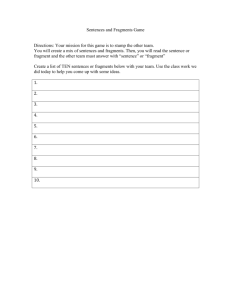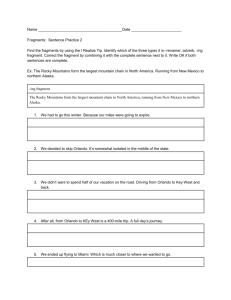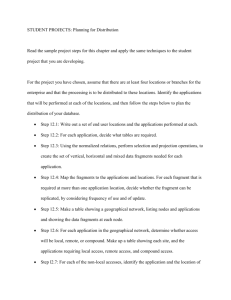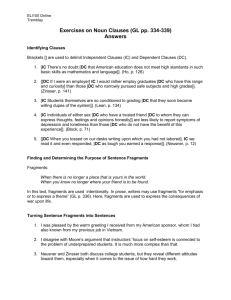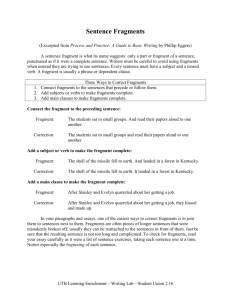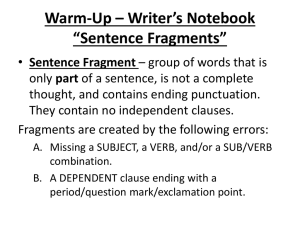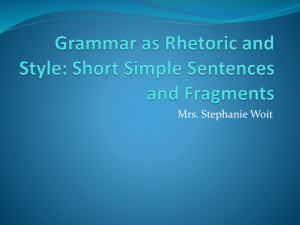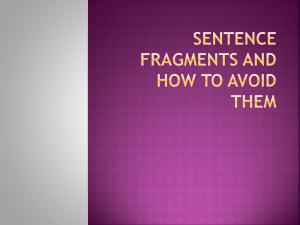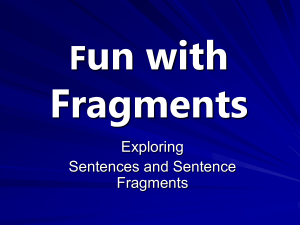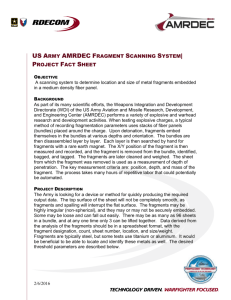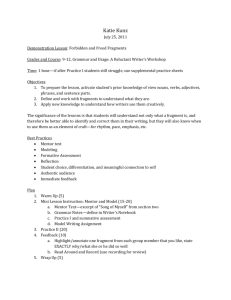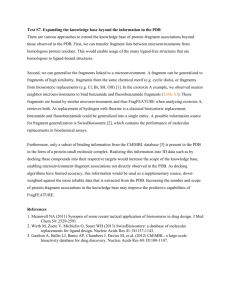Word - Bakersfield College
advertisement
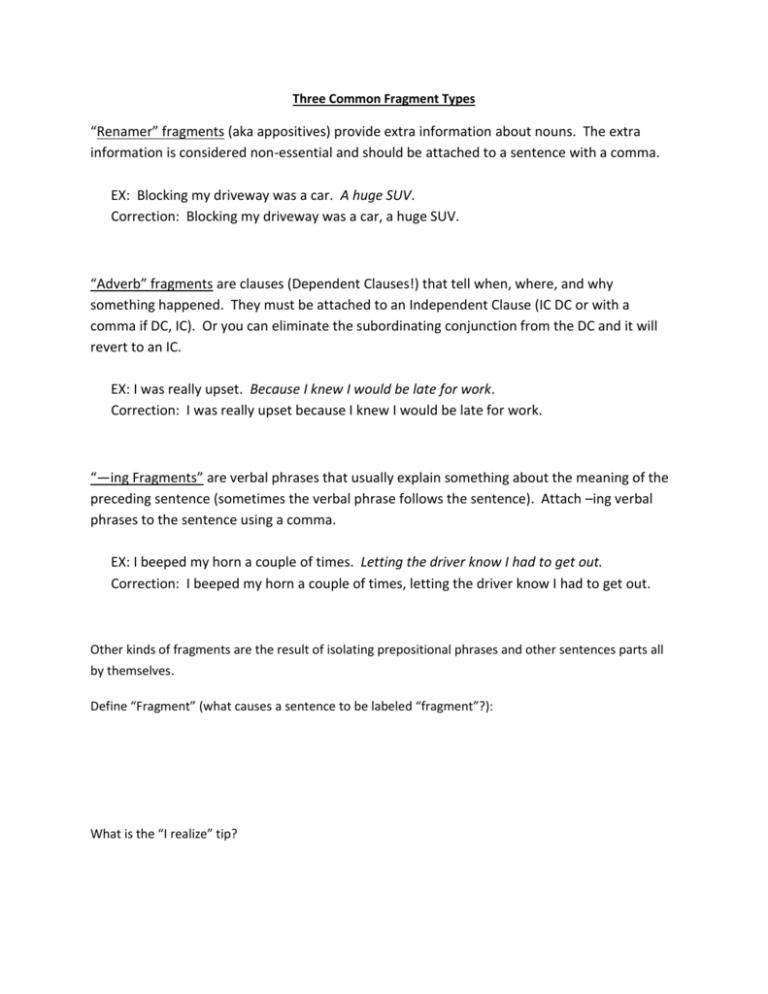
Three Common Fragment Types “Renamer” fragments (aka appositives) provide extra information about nouns. The extra information is considered non-essential and should be attached to a sentence with a comma. EX: Blocking my driveway was a car. A huge SUV. Correction: Blocking my driveway was a car, a huge SUV. “Adverb” fragments are clauses (Dependent Clauses!) that tell when, where, and why something happened. They must be attached to an Independent Clause (IC DC or with a comma if DC, IC). Or you can eliminate the subordinating conjunction from the DC and it will revert to an IC. EX: I was really upset. Because I knew I would be late for work. Correction: I was really upset because I knew I would be late for work. “—ing Fragments” are verbal phrases that usually explain something about the meaning of the preceding sentence (sometimes the verbal phrase follows the sentence). Attach –ing verbal phrases to the sentence using a comma. EX: I beeped my horn a couple of times. Letting the driver know I had to get out. Correction: I beeped my horn a couple of times, letting the driver know I had to get out. Other kinds of fragments are the result of isolating prepositional phrases and other sentences parts all by themselves. Define “Fragment” (what causes a sentence to be labeled “fragment”?): What is the “I realize” tip? Fragment Worksheet SENTENCE PRACTICE 2 (p 16) Directions: Identify the fragments in the sentences below by underlining them. Make corrections. 1. We took a trip to Florida this winter. Using frequent flyer miles. 2. We had to go this winter. Because our miles were going to expire. 3. We decided to skip Orlando. We didn’t want to spend half of our vacation on the road. Driving from Orlando to Key West and back. 4. After all, from Orlando to Key West is a 400-mile trip. A full day’s journey. 5. We ended up flying to Miami. Which is much closer to where we wanted to go. SENTENCE PRACTICE 3 (pp 16-7) Directions: Combine the 2 Independent Clauses in each numbered item by turning one of the clauses into a DC, a verbal phrase, or an appositive. 1. The keys end at Key West. Key West is the westernmost of the bigger keys. 2. The road to Key West is on a causeway. The causeway jumps from key to key on short bridges. 3. The causeway follows the track of an old railway line. The railway line went bankrupt. 4. Building the railroad was a huge task. One problem was that many hurricanes strike the keys. 5. What doomed the railroad, however, was a different problem. The problem was the lack of docking facilities on Key West. EDITING PRACTICE 1 (pp17-8) Directions: Underline 6 fragments in the paragraph below and correct them by marking directly on the sentences. Key West is a great place to visit. For a lot of reasons. First of all, the physical setting is magnificent. Blue sky and beautiful ocean views. Being on an island makes you much more aware of the water and the sky. Unlike the often cloudless skies on the Pacific coast, the skies in the keys often have small puffy clouds. Giving a sense of space and depth to the sky. The color of the water is always changing. Because the coral reefs reflect the continually changing play of sun and cloud. The fact that the ocean around Key West is so shallow and so varied gives the water vibrant colors. With dozens of shades of green and blue everywhere you look. The beaches in California are quite drab by comparison. Because they are mostly made up of uniform, gray sandy bottoms. Fragment Practice Quiz Part 1: Identify the fragments in the sentences below by underlining them. Make corrections. 1. Portions of the railroad were destroyed in the Labor Day Hurricane of 1935. A major storm that killed hundreds of people in the Keys. 2. The railroad was abandoned after the storm. Since rebuilding it would be too expensive. 3. Today, Key West is connected to the mainland by a highway. Much of it running on filled land originally built up for the old railroad. 4. The highway is an amazing construction. A series of bridges that goes from key to key for 127 miles. 5. In 2005 the highway easily survived Hurricane Wilma. Which flooded 60% of the homes in Key West. Part 2: Underline 7 fragments in the paragraph below and correct each by marking directly on the sentences. It is interesting to compare Key West with a similar ocean-side destination in California. Santa Barbara, for instance. Besides being beach destinations, they share another important feature. A lengthy Spanish heritage. Key West today doesn’t feel Spanish at all. Even though it (and the rest of Florida) was part of the Spanish empire for nearly three hundred years. There was never any permanent Spanish settlement there. Because there was no source of fresh water on the island. Key West was a temporary home for fisherman and pirates. A source of much humor today. Santa Barbara, on the other hand, is overflowing with its Spanish heritage. Especially in its architecture. Santa Barbara today looks classically Spanish. With its white buildings and red tile roofs.
